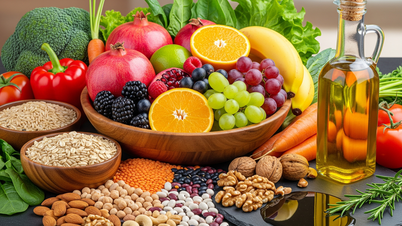The Mediterranean diet is based on the traditional way of eating of people living in countries such as Greece, Spain and Italy. These countries are famous for their variety of delicious and nutritious foods.
Meanwhile, the vegan diet encourages the use of more plant-based foods and brings benefits to health and the environment.
While these two diets have many similarities, there are some significant differences that you should consider.
This article will take a close look at the Mediterranean diet and the vegan diet to help you determine which is right for you.
The difference between the two diets
Both the Mediterranean diet and vegan diets feature a wide variety of nutrient-dense plant foods, including fruits, vegetables, nuts, and seeds.

Mediterranean diet (Photo: Getty).
This diet allows moderate consumption of animal products, including poultry, eggs, dairy, and seafood. Red meat and processed meat products such as bacon or ham are not prohibited, but should be limited.
In contrast, a vegan diet eliminates all animal-derived foods, even products such as honey, gelatin, and butter. Foods cooked in animal fats or containing animal-derived additives should also be avoided, including some colorants and spices.

The vegan diet is often seen as strict and difficult to maintain in the long term (Illustration: Getty).
While the Mediterranean diet doesn’t have strict rules about what is and isn’t allowed, it generally limits processed foods, grains, and sugars. However, these foods are all allowed on a vegan diet, as long as they don’t contain any animal products.
Effective in weight loss
Both the Mediterranean and vegan diets have been studied as being more effective for weight loss. Several studies have compared the two diets and found that the vegan diet may be more effective.
For example, one study in 62 overweight adults found that participants who followed a low-fat vegan diet for 16 weeks lost an average of 13.2 pounds (6 kg), while participants who followed a Mediterranean diet maintained their weight.
Note that any low-fat diet is low in calories, thus promoting weight loss.
Another small study found that people who followed a vegan diet for 4 weeks lost more weight than those who followed a Mediterranean diet for the same period.
On the other hand, one study showed that after 3 months, both diets were equally effective in improving levels of certain hormones, regulating energy balance and reducing hunger.
It is also important to note that vegan diets are generally more restrictive than the Mediterranean diet. As a result, vegan diets are often more difficult to maintain long-term, making them less effective for long-term weight loss.
While both diets can promote weight loss, some studies suggest that the vegan diet may be more effective. However, the vegan diet can also be difficult to maintain long-term due to its food restrictions.
More research is needed to better understand the effectiveness of these two diets for weight loss.
Heart health
The Mediterranean diet has been extensively studied for its ability to improve heart health and protect against heart-related disease and stroke.

The Mediterranean diet with lots of fish and seafood is good for the heart (Illustration: Tu Anh).
Vegan and vegetarian diets have also been shown to have benefits for heart health. For example, both diets have been shown to be associated with lower blood pressure and cholesterol, which are risk factors for heart disease.
A study comparing the effectiveness of Mediterranean and vegan diets on heart health found that the vegan diet significantly reduced LDL (bad) cholesterol, while the Mediterranean diet was more effective at reducing blood pressure.
Another small study also showed that a vegan diet reduced cholesterol levels, while a Mediterranean diet significantly improved the function of the heart's small blood vessels, which may reduce the risk of heart disease.
Thus, both diets appear to offer significant benefits for heart health and disease prevention.
Brain function
Many studies have shown that the Mediterranean diet improves brain function. Some have even noted that it helps protect against conditions like dementia and Alzheimer's disease.
Some studies have shown that adopting a vegan diet can help support brain function. It is speculated that it can also improve the good bacteria in your gut.
Although many studies have shown brain-boosting benefits of following a Mediterranean diet, research on the effects of a vegan diet on brain health is limited.
Control blood sugar
The Mediterranean diet and vegan diet both encourage a variety of nutrient-dense, high-fiber foods that can help support blood sugar control.
For example, a review of 15 studies found a link between a vegan diet and a reduced risk of type 2 diabetes. The diet was also linked to improved blood sugar control in people with the disease.
Another study found that the Mediterranean diet was also effective in controlling blood sugar levels and helping to reduce the risk of type 2 diabetes.
In fact, one large review found that following a Mediterranean diet reduced the risk of type 2 diabetes by 19%.
However, more research is needed on these two diets and to determine which one is better at controlling blood sugar.
So which diet should you choose?
As mentioned above, both the Mediterranean diet and the vegan diet have been linked to many health benefits, including improved weight loss, heart health, and blood sugar control.
Therefore, you should choose the appropriate diet based on your goals and preferences.
Compared to the Mediterranean diet, the vegan diet is often more restrictive and focuses more on which foods to avoid than which foods to eat.
As a result, a vegan diet can often feel harsh and difficult to sustain. It can also be associated with a high risk of nutritional deficiencies, such as vitamin B12 and iron, without proper meal planning.
In contrast, the Mediterranean diet encourages enjoying more nutrient-dense ingredients like heart-healthy fats, fiber-rich fruits and vegetables, and whole grains.
This helps people follow this diet long-term, and also helps you supplement all the necessary vitamins and minerals to help your body balance completely.
The Mediterranean diet also shares other good habits like sharing meals with family or friends.
In short:
Both the vegan diet and the Mediterranean diet are nutritious and provide many health benefits.
Both encourage the use of nutritious foods such as fruits, vegetables, whole grains, and legumes.
Vegan diets are often more restrictive and require careful meal planning to ensure your nutritional needs are met.
Be sure to consider factors like your goals, preferences, and priorities to determine whether a vegan or Mediterranean diet is right for you, or if you might want to explore more options beyond these two.
Source: https://dantri.com.vn/suc-khoe/chon-che-do-an-dia-trung-hai-hay-thuan-chay-de-song-khoe-hon-20250923110159955.htm


![[Photo] Solemn opening of the 12th Military Party Congress for the 2025-2030 term](https://vphoto.vietnam.vn/thumb/1200x675/vietnam/resource/IMAGE/2025/9/30/2cd383b3130d41a1a4b5ace0d5eb989d)
![[Photo] Panorama of the cable-stayed bridge, the final bottleneck of the Ben Luc-Long Thanh expressway](https://vphoto.vietnam.vn/thumb/1200x675/vietnam/resource/IMAGE/2025/9/30/391fdf21025541d6b2f092e49a17243f)
![[Photo] President Luong Cuong receives President of the Cuban National Assembly Esteban Lazo Hernandez](https://vphoto.vietnam.vn/thumb/1200x675/vietnam/resource/IMAGE/2025/9/30/4d38932911c24f6ea1936252bd5427fa)

![[Photo] General Secretary To Lam, Secretary of the Central Military Commission attends the 12th Party Congress of the Army](https://vphoto.vietnam.vn/thumb/1200x675/vietnam/resource/IMAGE/2025/9/30/9b63aaa37ddb472ead84e3870a8ae825)
![[Photo] The 1st Congress of Phu Tho Provincial Party Committee, term 2025-2030](https://vphoto.vietnam.vn/thumb/1200x675/vietnam/resource/IMAGE/2025/9/30/1507da06216649bba8a1ce6251816820)

































































































Comment (0)